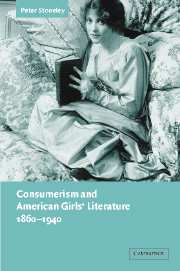Conclusion
Published online by Cambridge University Press: 22 September 2009
Summary
Given the way in which girls' fiction evinces a hunger for conspicuous wealth, the reader may be left in weary agreement with the James character who supposes that society “can never have been anything but increasingly vulgar.” Vulgarity is wealth that has not yet been refined and assimilated; it is a social power that still bears the marks of newness, crudity, self-interest and self-congratulation. Although the character to whom James gives these words – Mr. Longdon in The Awkward Age (1899) – is one of his most sympathetic, the reader may feel that it is Longdon's privileged background that allows him to view “vulgarity” as decline. Longdon's financial well-being – symbolized by his home – is of such long standing that its origins, or even the fact that it is financial, have been forgotten or disguised: “Everything on every side had dropped straight from heaven, with nowhere a bargaining thumbmark, a single sign of the shop.” James seems to encourage us to identify with Longdon and the novel's “girl,” Nanda Brookenham, who strive for personal integrity in a corrupt environment. We can assume the outlook of the graceful Longdon, whether we ourselves are from old money or not. Or we can try out Nanda's courageous, self-defeating and self-affirming honesty, as she rejects the wealthy suitor her mother wished her to accept.
- Type
- Chapter
- Information
- Consumerism and American Girls' Literature, 1860–1940 , pp. 141 - 144Publisher: Cambridge University PressPrint publication year: 2003



